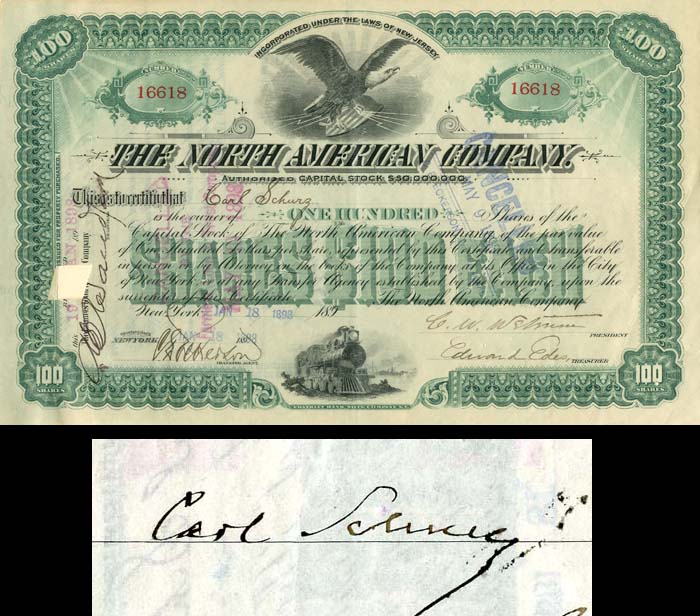North American Co. signed by Carl Schurz - Stock Certificate
Inv# AG1757 Stock
New York

Stock signed by Carl Schurz, Civil War General, on back. Printed by Franklin Bank Note Company N.Y. Portrait and biography included. Carl Christian Schurz (1829-1906) Carl Christian Schurz (March 2, 1829 – May 14, 1906) was a German revolutionary, American statesman and reformer, U.S. Minister to Spain, Union Army General in the American Civil War, U. S. Senator, and Secretary of the Interior. He was also an accomplished journalist, newspaper editor and orator, who in 1869 became the first German-born American elected to the United States Senate. During the Civil War, although Brig. Gen. Schurz served with distinction, known for his personal bravery and military discipline, his "German regiments" in 1862 were heavily criticized by the press for retreating during the Second Battle of Bull Run at Chancellorsville. After the war, Schurz was elected a Senator from Missouri in 1868. In 1869, he became the first U.S. Senator to offer a Civil Service Reform bill to Congress. During Reconstruction, Schurz was opposed to federal military enforcement and protection of African American civil rights, and held nineteenth century ideals of European superiority and fears of miscegenation. In 1870, Schurz formed the Liberal Republican Party, which opposed President Ulysses S. Grant's annexation of Santo Domingo, and his use of the military to destroy the Ku Klux Klan in the South under the Force Acts. Schurz lost the 1874 Senatorial election to Democratic Party challenger and former Confederate, Francis Cockrell. After leaving office, he worked as an editor for various newspapers. In 1877, Schurz was appointed Secretary of Interior by President Rutherford B. Hayes. Although Schurz honestly attempted to reduce the effects of racism toward Native Americans and was partially successful at cleaning up corruption, his solutions towards American Indians "in light of late twentieth-century developments", were repressive. Indians were forced to move into low quality reservation lands that were unsuitable for tribal economic and cultural advancement. Promises made to Indian chiefs at White House meetings with President Rutherford B. Hayes and Schurz were not always kept. During his later years, Schurz was perhaps the most prominent independent in American politics, noted for his high principles, his avoidance of political partisanship, and his moral conscience. His wife, Margarethe Schurz, was instrumental in establishing the kindergarten system in the United States. Schurz is famous for saying: "My country, right or wrong; if right, to be kept right; and if wrong, to be set right." Upon leaving the Interior Department in 1881, Schurz moved to New York City. That year Henry Villard acquired the New York Evening Post and The Nation and turned the management over to Schurz, Horace White and Edwin L. Godkin. Schurz left the Post in the autumn of 1883 because of differences over editorial policies regarding corporations and their employees. In 1884, he was a leader in the Independent (or Mugwump) movement against the nomination of James Blaine for president and for the election of Grover Cleveland. From 1888-1892, he was general American representative of the Hamburg American Steamship Company. In 1892, he succeeded George William Curtis as president of the National Civil Service Reform League and held this office until 1901. He also succeeded Curtis as editorial writer for Harper's Weekly in 1892 and held this position until 1898. In 1895 he spoke for the Fusion anti-Tammany Hall ticket in New York City. He opposed William Jennings Bryan for president in 1896, speaking for sound money and not under the auspices of the Republican party; he supported Bryan 4 years later because of anti-imperialism beliefs, which also led to his membership in the American Anti-Imperialist League. True to his anti-imperialist convictions, Schurz exhorted McKinley to resist the urge to annex land following the Spanish-American War.
A stock certificate is issued by businesses, usually companies. A stock is part of the permanent finance of a business. Normally, they are never repaid, and the investor can recover his/her money only by selling to another investor. Most stocks, or also called shares, earn dividends, at the business's discretion, depending on how well it has traded. A stockholder or shareholder is a part-owner of the business that issued the stock certificates.










Ebay ID: labarre_galleries